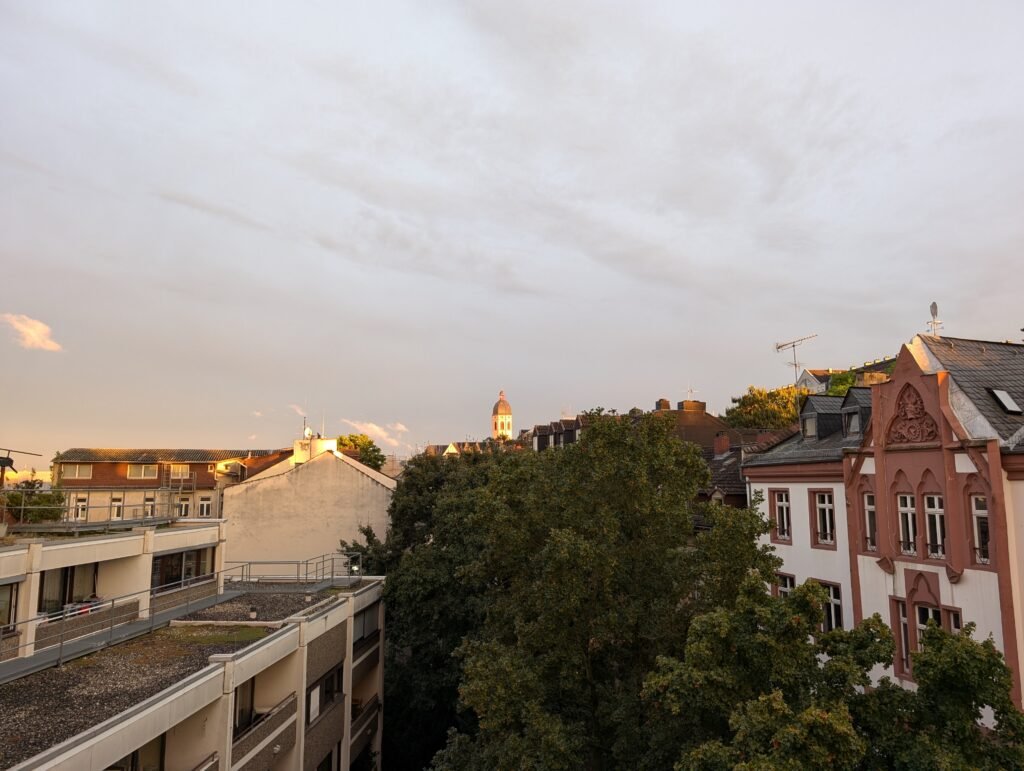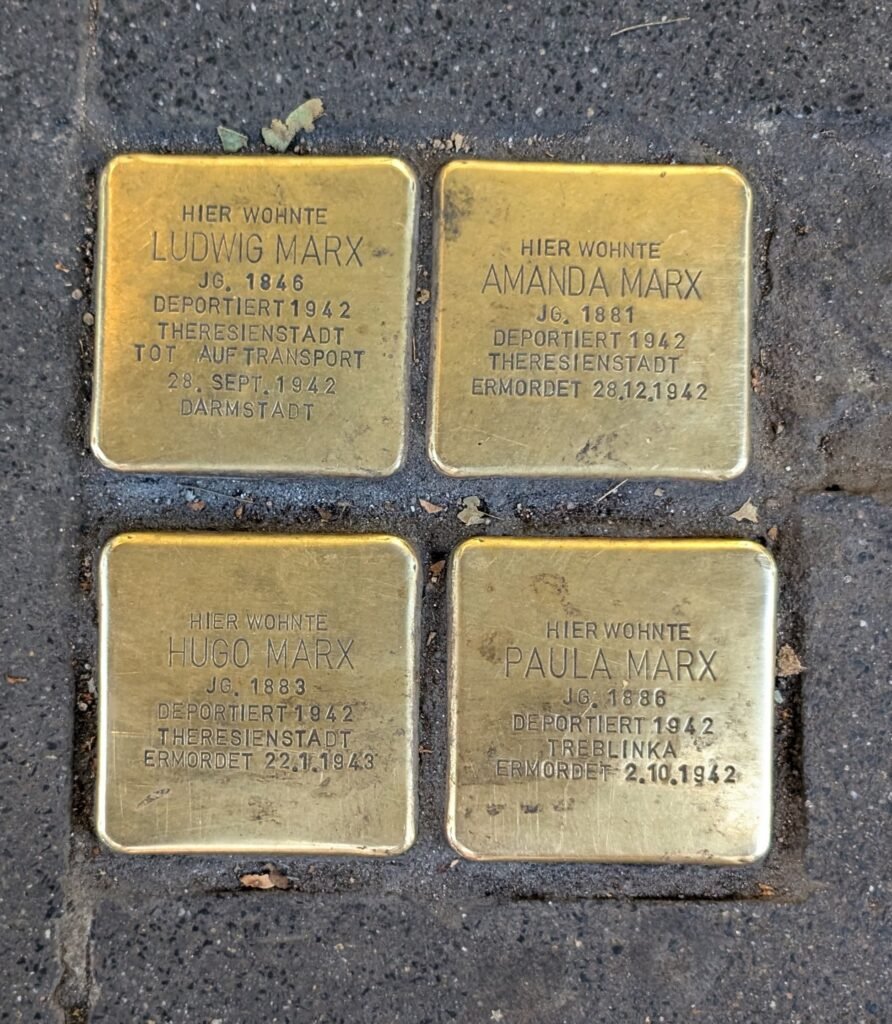seeing water, stones, and names
Seeing water
When I look out my window, I’ll sometimes notice planes gliding down towards Frankfurt Airport. Sometimes, but thankfully not all the time, I hear them too — the engine whine and deep vibrations slowly fading as the plane gets closer to the ground and further from my window.

Inside the cockpits of those planes, the plane would start talking to the pilots. In a Boeing 747, the plane would call out “DECIDE” at the altitude where the pilots must either see the runway to continue their approach or if they can’t, they must abandon it.1Airplane information sourced from this article.
The friends I’ve talked to the past few weeks before embarking on this exchange semester have asked me why Frankfurt? Why Germany? Why did I make this decision? I would search for an answer, unable to settle on a main reason. I would say it’s because my friends are on the same continent. Or bluntly, because there’s an available slot for me here.2Both reasons are true.
Now that I’m physically here, I should craft a better answer on why Frankfurt, why Germany, and why Europe. I have four months to do so.
The story goes:3Sourced from David Foster Wallace’s speech here. there are two young fish swimming along and they happen to meet an older fish swimming the other way, who nods at them and says “Morning, boys. How’s the water?” And the two young fish swim on for a bit, and then eventually one of them looks over at the other and goes “What the hell is water?”
I think this story applies for Singapore, the bubble-state. There is little crime and even less serious crime. Government works most of the time and does so without the sins of corruption. Life is sanitized clean. I say this without judgement. It’s merely an observation. But this environment creates sheltered Singaporeans, of which I am a card-carrying member.
Years ago, I read this blog post that accused my generation as the least interesting generation. To support his argument, the author listed the paragraph-length biographies of famous people. Steve McQueen, Jack London, J.D. Salinger, Ernest Hemingway. Besides their fame, all of them had lived adventurous lives built upon risk-taking.
Before Steve McQueen’s 18th birthday, he had worked on a farm, joined a circus, sold pens at a traveling carnival, hitchhiked and rode the rails across the country, worked as a lumberjack in Canada, labored on a chain gang in the Deep South (punishment for the crime of vagrancy), served a short (and illegal — he was underage) stint in the Merchant Marine, and joined the Marine Corps for a three-year enlistment. […]
Ernest Hemingway learned fishing, hunting, and bushcraft skills as a toddler; worked on a farm at 15, took a weeks-long backpacking trip at 16 (subsisting on fish he caught himself), and served as an ambulance driver in WWI at age 18. As an aid worker, he earned the Italian Silver Medal for Valor for carrying a wounded soldier to safety, while being hit with gun and mortar fire twice himself.
The Least Interesting Generation in the AOM
If you’re Singaporean-Chinese, there’s a good chance that our ancestors lived lives closer to McQueen and Hemingway than you or I. They escaped encroaching wars or poverty that plagued their village in Southern China4Which was probably the Republic of China, and not the People’s Republic of China and boarded ships that would sail them to a distant land with little more than the clothes on their body. Upon arrival, they would go around searching for their respective clan associations in hopes of finding a place to stay and a job to work. Before boarding that ship, they may have forced themselves to remember the name of another village-member who had left months ago for Nanyang. Very few of them joined the ranks of Hemingway in terms of fame, but they took risks. They ventured here to better their lives and the lives of their children and grandchildren. They worked and they saved.5And some indulged in alcohol or gambling. They made history, in their own quiet ways.
What about myself? If I authored a book, what would my short author bio read? That I was born in this city, went to this school, then graduated at this university with this degree, then wrote this book. If I wanted to share more, it would be that I’m a fan of this popular TV show and that I love listening to music from this band.
What stories will I have to share in the future? I don’t need to commit crimes so I have something to share in front of the proverbial fireplace towards my hypothetical grandchildren, but it should be something more than the above. I will have to decide if I can add to this story while in my exchange semester.
Here lived
Memorials are often segregated from society. They are nestled away in some park and visited once a year on a special date. Germany has those memorials too. But I’ve seen a different type.
In places where all types of people would walk on daily, there are rubiks cube sized metal blocks that are inserted into the ground. They are shinier that the surrounding asphalt or cobblestones, but there is no special sign that indicates their presence nor is there a barrier that prevents people from stepping on them.
The inscription on each stone begins “Here lived”, followed by the victim’s name, date of birth, and fate: internment, suicide, exile or, in the vast majority of cases, deportation and murder.
“To read the stone, you must bow before the victim”, Michael Friedrichs-Friedländer
“I find it much more moving than these colossal or labyrinthine memorials, which to me feel quite bombastic and anonymous,” says Marion Papi, a translator and writer who also lives a few doors down from Spitzenberger on Duisburger Strasse. “The Stolpersteine are so much more vivid and personal.”
‘Stumbling stones’: a different vision of Holocaust remembrance from The Guardian
I’ll keep a lookout for them.

Names, not numbers
When we took over the keys of my apartment in Mainz, I asked the landlord’s agent what our unit number was. Because I didn’t see one in the rental contract nor did I see a unit number by our door. I thought he didn’t understand what I was asking because he equivocated. It was I who didn’t understand.
It’s normal in many German apartments, including large ones, to not have unit numbers. Instead, mailmen look at the names of the letters and slot them accordingly into the unnumbered, but named postboxes. The same thing applies for doorbells. Some have family names pasted on them. This might be super ordinary for Germans, but this time I was the older fish that could see the water.

Comments? Text or email me.
Despite it’s title there are only (strictly speaking) two observations on Mainz. I had some ideas and wanted to write them down so I did this in the first section of this piece. I should write faster. I want to spend more time in the place I’m at, not on WordPress. I understand that the least interesting generation argument sounds pretentious, but I’m not saying that my generation must have and spend lots of money to live more interesting lives. Much of what Hemingway’s generation did, they did without two pennies to rub together and the same applies for my ancestors. I’m grateful for them and the risks they took to leave their lives behind and start new ones in Nanyang and for the opportunities I have to do this exchange semester.
Thanks to James Howe for reading a draft of this.
6 minute read. Writing time: 80 minutes. Editing time: 45 minutes.
First published:
September 9, 2024
Last updated:
Footnotes
- 1Airplane information sourced from this article.
- 2Both reasons are true.
- 3Sourced from David Foster Wallace’s speech here.
- 4Which was probably the Republic of China, and not the People’s Republic of China
- 5And some indulged in alcohol or gambling.
